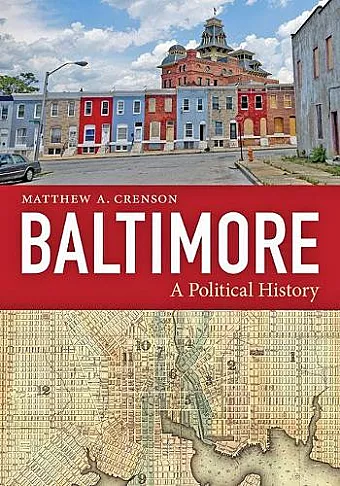Baltimore
A Political History
Format:Paperback
Publisher:Johns Hopkins University Press
Published:15th Nov '19
Currently unavailable, and unfortunately no date known when it will be back

How politics and race shaped Baltimore's distinctive disarray of cultures and subcultures.
Charm City or Mobtown? People from Baltimore glory in its eccentric charm, small-town character, and North-cum-South culture. But for much of the nineteenth century, violence and disorder plagued the city. More recently, the 2015 death of Freddie Gray in police custody has prompted Baltimoreans—and the entire nation—to focus critically on the rich and tangled narrative of black–white relations in Baltimore, where slavery once existed alongside the largest community of free blacks in the United States.
Matthew A. Crenson, a distinguished political scientist and Baltimore native, examines the role of politics and race throughout Baltimore's history. From its founding in 1729 up through the recent past, Crenson follows Baltimore's political evolution from an empty expanse of marsh and hills to a complicated city with distinct ways of doing business. Revealing how residents at large engage (and disengage) with one another across an expansive agenda of issues and conflicts, Crenson shows how politics helped form this complex city's personality.
Crenson provocatively argues that Baltimore's many quirks are likely symptoms of urban underdevelopment. The city's longtime domination by the general assembly—and the corresponding weakness of its municipal authority—forced residents to adopt the private and extra-governmental institutions that shaped early Baltimore. On the one hand, Baltimore was resolutely parochial, split by curious political quarrels over issues as minor as loose pigs. On the other, it was keenly attuned to national politics: during the Revolution, for instance, Baltimoreans were known for their comparative radicalism. Crenson describes how, as Baltimore and the nation grew, whites competed with blacks, slave and free, for menial and low-skill work. He also explores how the urban elite thrived by avoiding, wherever possible, questions of slavery versus freedom—just as wealthier Baltimoreans, long after the Civil War and emancipation, preferred to sidestep racial controversy.
Peering into the city's 300-odd neighborhoods, this fascinating account holds up a mirror to Baltimore, asking whites in particular to reexamine the past and accept due responsibility for future racial progress.
This is a magnificent study, sweeping in scope and rich in detail . . . There is much to learn from the Baltimore experience, and this gracefully written volume tells the tale well. Highly recommended.
—Choice
Matthew A. Crenson takes readers on an exhilarating ride through more than two centuries of American history. With lucid prose, rapid pacing, and a parade of dramatic incidents, he addresses the critical issues that have confounded citizens and historians since the nation's founding.
—Journal of American History
A comprehensive look at the manifold forces that influenced and impeded city government for more than 300 years. Crenson also possesses a keen eye—and nose—for the two-way traffic between politics and the body politic. He scrapes away charm (and myth) to expose less savory features of civic history.
—Johns Hopkins University Arts & Sciences Magazine
ISBN: 9781421436333
Dimensions: 254mm x 178mm x 26mm
Weight: 953g
632 pages